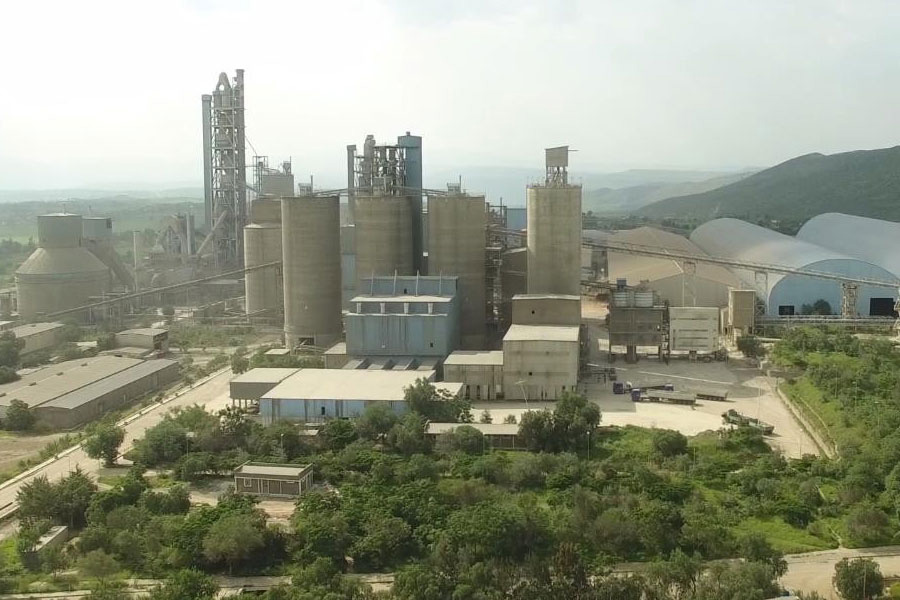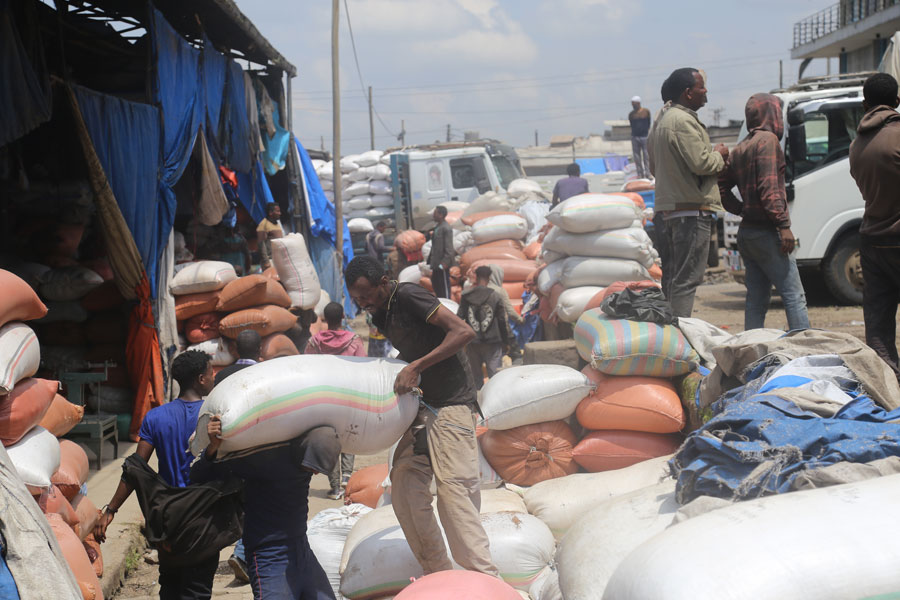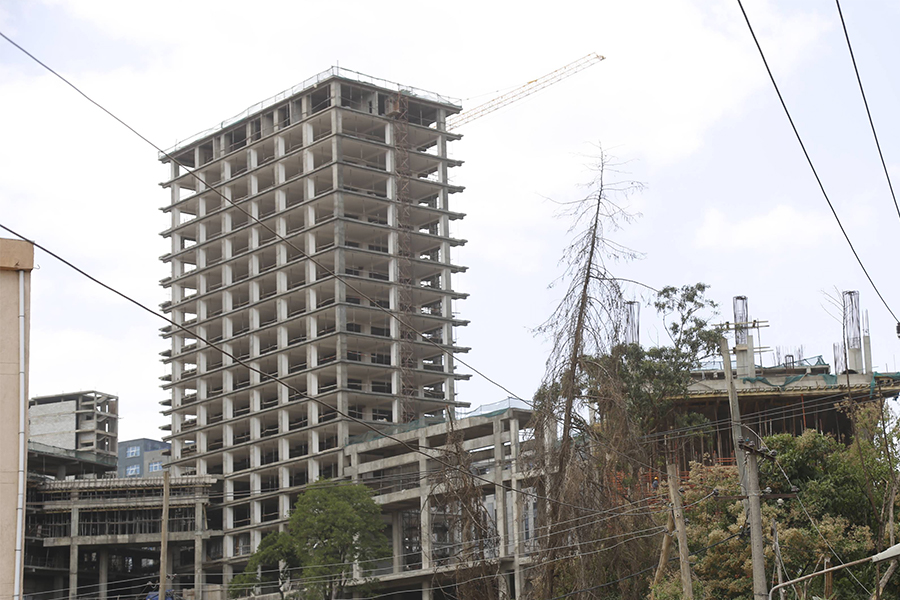
Barely a week after the government set aside its cement market regulatory policy, cement prices have spiked up to as high as 900 Br a quintal, double the official price from two weeks ago.
The surge in the price of cement comes at a bad time as cement plants are preparing to undergo maintenance, a state of affairs that industry insiders fear would further disrupt the cement market. This is a major setback for the construction industry, which has been stagnant because of the soaring cost of inputs.
Officials at the Ministry of Trade & Industry decided to let the trading of cement be run by market forces, hoping the demand for the item would be low during the rainy season.
Prior to its latest measure, which became effective on July 14, 2021, the Ministry has been tightly regulating the market, even assigning its employees to each of the cement plants to regulate the distribution process, while repeatedly cracking down on retailers that were allegedly making unreasonable price adjustments.
The price spike goes against the consensus reached between the officials of the Ministry and factories, wholesalers, and retailers not to raise prices indiscriminately.
Factories, which have not raised their prices thus far, are blaming distributors and retailers for the spike, contending that the situation is beyond their control.
"The unhealthy market practices by distributors and retailers and the underground market they have created are responsible for the price upsurge," said Fitsum N. Demissie, CEO of East African Trading House and board member of the Ethiopian Cement Manufacturers Association on behalf of National Cement. The factory currently sells cement at 349 Br a quintal.
The government's decision seems to have backfired as not only have prices risen but it has also forced retailers to sit in empty warehouses. This is well observed by Mulugeta Desalegn, who works at one of the many cement retail stores in the Megenagna area.
After waiting a month for a supply of 400 quintals of cement from a broker, his employer sold out the entire stock for 720 Br a quintal in a single day last week. "Demand has not slowed much since the onset of the rainy season, contrary to the Ministry's predictions," he said.
Addis Midiksa, CEO of AMG Construction, which has been in the industry for a decade, sees the claims of lowered demand as ludicrous, citing that projects might slow down during the rainy season but they do not cease completely.
"We can't just stop a construction project, we have to finish in time," he said, adding that he recently paid 900 Br for a quintal of cement. The high prices and shortage might lead to project delays, according to Addis, and this will mean even more costs incurred.
Industry insiders also assert that brokers have been more directly involved in the market, hoarding products and supplying contractors directly themselves following the change in the government's policy.
Tewodros Shimeles, CEO of TABU Construction Plc, cites that he was unable to buy any cement from his regular retailer in the Qera neighbourhood last week as there was none left in stock.
"Some contractors get cement without having to come to the market, through deals with retailers," said Tewodros.
His company is still waiting for the remaining 400 quintals of a 600 quintal quota assigned from Mugher and Derba cement factories.
There are currently 13 cement factories operating in the country, producing some 8.4 million tonnes of cement annually, although demand is estimated to sit somewhere around 11.5 million tonnes.
Derba Cement, owned by Mohammed Ali Al-Amoudi and his family, has the largest capacity of 2.5 million tonnes, followed by Messebo Cement, which produces 200,000tn less. The latter had been closed for four months due to the military conflict in the Tigray Regional State, where it is located before it began partial production in late March this year. It closed its doors again two weeks ago due to the ongoing conflict in the region.
Samuel Halala, director-general of the Chemical & Construction Inputs Industry Development Institute, believes that increased production at cement factories will enable the government to achieve market equilibrium. However, he did not deny foreign currency shortages and a lack of spare parts are still curtailing the factories' production capacity, explaining that the shortfall creates a breeding ground for hoarding practices and price gouging.
All the cement factories are set to undergo maintenance during the rainy season between now and September, with Mugher already in the process, while Messebo was being maintained before it stopped operations after the Ethiopian National Defense Force left Tigray. The government has allotted 85 million dollars for the purchase of spare parts and other necessary materials for the factories and officials expect the renovations to improve production.
Samuel hopes that if the plants are fully maintained, their annual production will climb to 12 million tonnes, minimising the shortage in the market and stabilising prices.
On his part, Tewodros of TABU construction would like to see the government bring back its regulatory policies to control market prices and hoarding.
PUBLISHED ON
Jul 24,2021 [ VOL
22 , NO
1108]

News Analysis | Mar 04,2023

Fortune News | Aug 19,2023

Fortune News | May 04,2019

Fortune News | Jul 02,2022

Fortune News | May 23,2021

Dec 22 , 2024 . By TIZITA SHEWAFERAW
Charged with transforming colossal state-owned enterprises into modern and competitiv...

Aug 18 , 2024 . By AKSAH ITALO
Although predictable Yonas Zerihun's job in the ride-hailing service is not immune to...

Jul 28 , 2024 . By TIZITA SHEWAFERAW
Unhabitual, perhaps too many, Samuel Gebreyohannes, 38, used to occasionally enjoy a couple of beers at breakfast. However, he recently swit...

Jul 13 , 2024 . By AKSAH ITALO
Investors who rely on tractors, trucks, and field vehicles for commuting, transporting commodities, and f...

Oct 25 , 2025
The regulatory machinery is on overdrive. In only two years, no fewer than 35 new pro...

Oct 18 , 2025
The political establishment, notably the ruling party and its top brass, has become p...

Oct 11 , 2025
Ladislas Farago, a roving Associated Press (AP) correspondent, arrived in Ethiopia in...

Oct 4 , 2025
Eyob Tekalegn (PhD) had been in the Governor's chair for only weeks when, on Septembe...